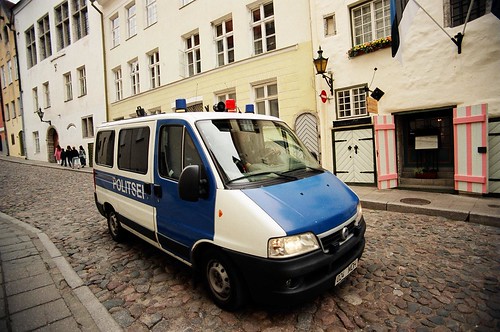 Narva, Estonia's third largest city, is now at the centre of geopolitical tensions not seen in the region since the collapse of the Soviet Union nearly two decades ago. Some analysts are calling it 'the new Cold War'. The concern spreads far beyond Narva and the frontier. Estonia has been hit by riots linked to the tensions. New disputes pit states that emerged from the collapse of the Soviet Union throughout much of Eastern Europe against their former overlords.
Narva, Estonia's third largest city, is now at the centre of geopolitical tensions not seen in the region since the collapse of the Soviet Union nearly two decades ago. Some analysts are calling it 'the new Cold War'. The concern spreads far beyond Narva and the frontier. Estonia has been hit by riots linked to the tensions. New disputes pit states that emerged from the collapse of the Soviet Union throughout much of Eastern Europe against their former overlords.The internet warfare broke out on April 27th, amid a furious row between Estonia and Russia over the removal of a Soviet war monument from the centre of the capital, Tallinn, to a military cemetery. Estonia's prime minister, Andrus Ansip, first raised the issue for party advantage. He wanted his Reform party, founded by zealously free-market ex-communists, to pinch some patriotic votes from other centre-right parties in the March parliamentary elections. His country is now paying a colossal political, social and diplomatic price.
Stonians are blaming Russia for stoking riots in Tallinn last month in which one died and 153 were injured, for the roughing up of Estonian diplomats in Moscow and for a massive 'cyber-attack' on the infrastructure of the small Baltic state, as The Observer publishes:
According to Andres Kasekamp, director of Tallinn's Foreign Policy Institute, the Russian government is mounting a deliberate attempt to destabilise former Soviet republics. 'This strategy is intensifying as Moscow's attitude to the US, the UK and the EU becomes more aggressive and assertive,' Kasekamp said. 'They are seeing how far they can push us, the European Union, Nato, the Americans, everybody.' Some Estonians even fear Moscow may be searching for a casus belli. At the international level the Russian testing last week of an inter-continental ballistic missile led to an extraordinary diplomatic spat between the US Secretary of State, Condoleezza Rice - who deplored Moscow's 'missile diplomacy' - and Russian President Vladimir Putin, who attacked American 'imperialism'.Then there are profound disagreements over the future of Kosovo and policy on Iran, a row over the rights of major British commercial investors to parts of the massive Siberian gasfields, harassment of British officials and diplomats in Moscow, and a series of apparently state-encouraged propaganda pieces in the Russian media against the West. Analysts are talking of relations between Moscow and London being at a 25-year low.
The Economist is more critic
Ignoring the looting, media there claim that “anti-fascist schoolchildren” trying to stop Estonians “demolishing” the memorial were “tortured” by the “inhuman” police. Russia's foreign minister said Estonia was behaving “disgustingly”. A delegation of Russian politicians, invited to see that the monument had been moved, not demolished, called for the government's resignation before setting off. On arrival, they repeatedly insulted their hosts, while demanding that “political prisoners” be freed.This has scary echoes for Estonians. In 1940 a Soviet delegation issued similarly phrased demands. Weeks later, Estonia was wiped off the map. The protests also sit oddly with the ruthless way that entirely peaceful and purely political protests are squashed in Russia, as well as with the often casual treatment of war memorials there.
The turning towards the west is repeated in almost every field. The ruling coalition in Estonia, returned to power after elections in March, has continued the fiercely Thatcherite-Reaganite economics of its recent predecessors. A single flat income tax of 22 per cent, low business taxes and cheap, weak welfare provision have, government supporters claim, led to a spectacular annual economic growth of more than 10 per cent and negligible unemployment - outside the poorer industrial and agricultural areas. Money is coming from the West too.
But why Russia is behaving in this way? For The Observer domestic factors are also important: "With parliamentary and presidential elections within the next year, Putin is playing to the crowd and strengthening the position of his possible successor, the Defence Minister Sergei Ivanov. 'To an extent it's theatre,' said one UK-based diplomat. 'And it is logical that Estonia has a key role."
But, even if there was some outside interference, the demonstrations around the memorial and the riots were a powerful reminder to Estonia's government not to forget the country's ethnic Russian minority.




No comments:
Post a Comment